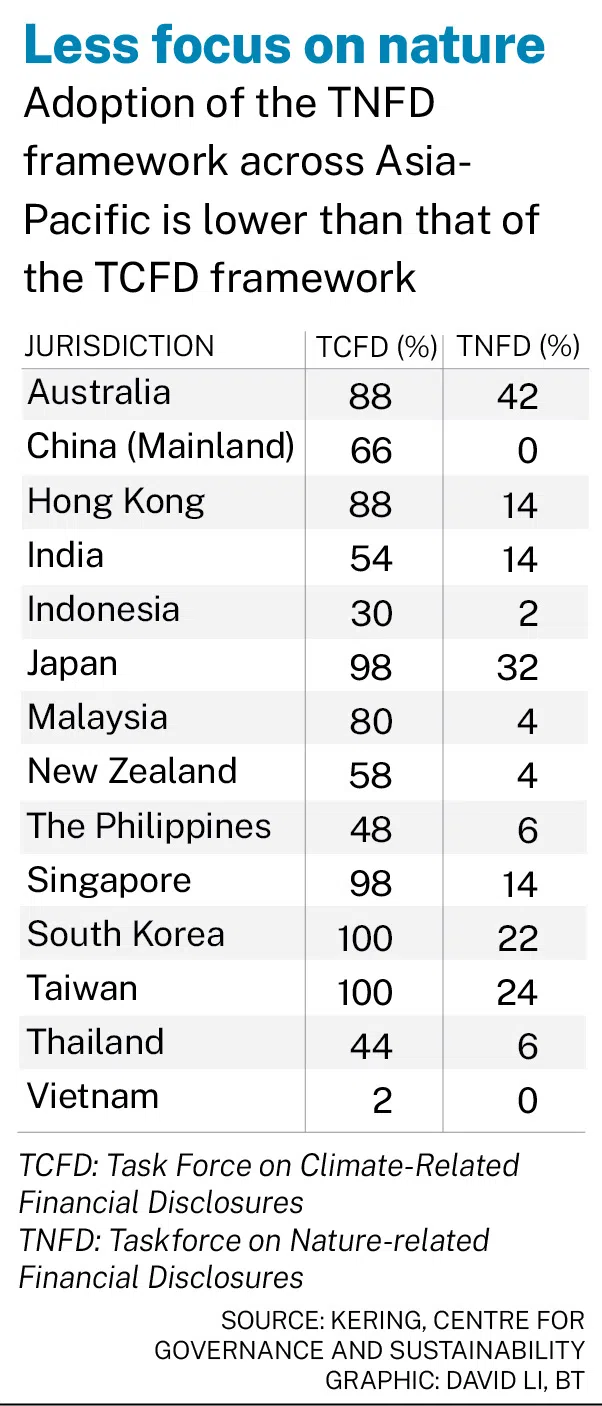Only 13% of large Asia-Pac companies have adopted key nature reporting framework: study
Study by Kering and the Centre for Governance and Sustainability under NUS calls for companies to accelerate adoption of TNFD framework

ONLY 13 per cent of 700 large Asia-Pacific listed companies have disclosed their alignment with the Taskforce on Nature-related Financial Disclosures (TNFD) – a key global framework for companies to assess issues such as deforestation and water pollution.
This is among the findings of a study released on Tuesday (Jan 14) by French luxury group Kering and the Centre for Governance and Sustainability (CGS) under the National University of Singapore (NUS).
Kering and CGS analysed the annual and sustainability reports of the top 50 companies by market capitalisation in each of 14 selected Asia-Pacific markets. These included Australia, mainland China, India, Japan, South Korea and Singapore.
Australian companies had the highest TNFD framework adoption rate of 42 per cent, followed by Japan (32 per cent) and Taiwan (24 per cent). Singapore’s adoption rate stood at 14 per cent. No companies in mainland China and Vietnam have adopted the framework.

The study noted that nature-related disclosures are more nascent in Asia-Pacific than climate-related disclosures.
Of the 700 companies assessed, 68 per cent disclosed their alignment with the Task Force on Climate-Related Financial Disclosures (TCFD) framework, which focuses on issues such as carbon emissions and coping with extreme weather.
Navigate Asia in
a new global order
Get the insights delivered to your inbox.
And of the 375 companies that have a materiality matrix – a tool that identifies significant environmental, social and governance issues – only 31 per cent prioritised nature-related issues as mid-to-high priority. In contrast, 82 per cent considered climate issues to be of mid-to-high priority.
The adoption of nature-related commitments was also low. Only 34 per cent of companies made commitments such as:
- Net gain, net positive impact or no net loss in terms of biodiversity
- No deforestation
- No exploitation of workers, local communities or small-scale growers
- Use of certified raw materials
On the positive side, 74 per cent of companies specified at least one nature-related opportunity – mostly on ecosystem protection, restoration and regeneration.
However, only 9 per cent cited capital flow and financing as opportunities, “suggesting that more capital should be directed towards addressing nature-related concerns”, the report said.
The report called on companies to accelerate adoption of the TNFD framework, as well as to conduct deeper analysis to uncover the potential financial impacts and risks of nature-related issues.
It also urged companies to channel more capital towards nature-related opportunities, especially through green financing and investments in nature initiatives.
Challenges to tackle
As climate reporting matures in the Asia-Pacific, “integrating nature-related considerations into these frameworks is crucial for a comprehensive understanding of environmental risks”, said CGS’ director Lawrence Loh.
“By aligning with global nature-reporting frameworks, companies can enhance their risk management, drive meaningful change, and contribute to a more sustainable future,” he added.
During a panel discussion following the release of the study, UOB chief sustainability officer Eric Lim noted that one of the key challenges with nature-related issues is in setting the right kinds of targets.
This is especially so, given the diverse range of issues – from land use to biodiversity – and the varying local contexts. “A target you could set for an industry in Singapore may or may not be relevant to the same industry in Indonesia,” he said.
He added that his wish for 2025 is to have “understandable and consistent” language on nature-related issues so that civil society, the real economy and regulators can discuss the matter “in a way where everybody knows what everybody’s talking about”.
“Because with that common understanding, we can build frameworks, products, push for action, set metrics and targets. We can build so much from that.”
Fellow panellist Esther An, sustainability chief of property player City Developments, similarly expressed hope that all stakeholders can be aligned and “put nature before all the other business interests”.
With the incoming presidency of Donald Trump in the US, some have raised concerns that nature issues could take a back seat. Asked about her outlook on the Trump administration, An struck an optimistic note.
“Yes, his influence, his impact, will be there. But this is not the first time that we see Trump in action… I’m sure that sustainable development, low-carbon investment or green building technology solutions have a lot of opportunity for growth,” she said, adding that “the world is bigger than just one economy”.
Decoding Asia newsletter: your guide to navigating Asia in a new global order. Sign up here to get Decoding Asia newsletter. Delivered to your inbox. Free.
Copyright SPH Media. All rights reserved.


